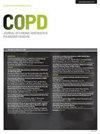阿尔法-1 抗胰蛋白酶缺乏症相关肺病患者队列的长期 SGRQ 稳定性
IF 3.1
3区 医学
Q1 Medicine
International Journal of Chronic Obstructive Pulmonary Disease
Pub Date : 2024-04-10
DOI:10.2147/copd.s443183
引用次数: 0
摘要
背景:健康相关生活质量(HRQoL)评估(如圣乔治呼吸问卷(SGRQ))经常被用作结果测量方法,以评估肺部疾病患者感知到的健康状况变化。有几个因素与 SGRQ 的恶化有关,包括症状(呼吸困难、喘息)和运动不耐受。这些研究结果是否适用于α-1抗胰蛋白酶缺乏症(AATD)患者的研究仍不全面。这项纵向研究考察了美国 AATD 相关肺病患者队列中 SGRQ 分数的变化轨迹,并确定了与纵向变化相关的因素:方法:参加疾病管理项目 AlphaNet 的 AATD 相关肺病患者在 2009 年至 2019 年期间进行了≥ 3 次 SGRQ 测量,临床重要变量的基线数据被纳入这些分析。不包括肺移植后收集的数据。混合效应模型分析用于评估 SGRQ 总分和分量表得分随时间的变化,以及基线时改良医学研究委员会(mMRC)量表、氧气使用情况、年龄、性别、有痰咳嗽和恶化频率的变化。进行了敏感性分析,以检查幸存者偏差的潜在影响:参与者(n=2456,平均年龄(57.1±9.9)岁,47%为女性)基线时的平均 SGRQ 总分为(44.7±18.9)分,48%的人定期使用氧气,55%的人每年病情加重次数≥2 次。随访时间的中位数为 6 年(IQR 3-9 年)。在整个观察期间,SGRQ 总分和分量表保持稳定。年龄、mMRC分类、有无有痰咳嗽、病情恶化频率和基线吸氧情况与SGRQ总分的变化率显著相关(p< 0.0001):我们观察到,在这组 AATD 相关肺病患者中,HRQoL 具有长期稳定性,SGRQ 的变化率与基线 mMRC、加重频率、有痰咳嗽和氧气使用之间存在关联。本文章由计算机程序翻译,如有差异,请以英文原文为准。
Long-Term SGRQ Stability in a Cohort of Individuals with Alpha-1 Antitrypsin Deficiency-Associated Lung Disease
Background: Health-related quality of life (HRQoL) assessments such as St. George’s Respiratory Questionnaire (SGRQ) are often used as outcome measures to evaluate patient-perceived changes in health status among individuals with lung disease. Several factors have been linked to deterioration in SGRQ, including symptoms (dyspnea, wheezing) and exercise intolerance. Whether these findings apply to individuals with alpha-1 antitrypsin deficiency (AATD) remains incompletely studied. This longitudinal study examines the trajectory of SGRQ scores in a cohort of United States individuals with AATD-associated lung disease and defines factors associated with longitudinal change.
Methods: Individuals with AATD-associated lung disease enrolled in AlphaNet, a disease management program, who had ≥ 3 SGRQ measurements collected between 2009 and 2019, and baseline data for clinically important variables were included in these analyses. Data collected after lung transplants were excluded. Mixed-effects model analyses were used to evaluate the changes in SGRQ total and subscale scores over time and by modified Medical Research Council (mMRC) Scale, use of oxygen, age, sex, productive cough, and exacerbation frequency at baseline. Sensitivity analyses were conducted to examine the potential effect of survivor bias.
Results: Participants (n=2456, mean age 57.1± 9.9 years, 47% female) had a mean SGRQ total score of 44.7± 18.9 at baseline, 48% used oxygen regularly, and 55% had ≥ 2 exacerbations per year. The median length of follow-up was 6 (IQR 3– 9) years. The SGRQ total score and subscales remained stable throughout the observation period. Age, mMRC categories, presence or absence of productive cough, frequency of exacerbations, and use of oxygen at baseline were significantly associated with the rate of change of SGRQ total (p< 0.0001).
Conclusion: We observed long-term stability in HRQoL and an association between the rate of change in SGRQ and baseline mMRC, exacerbation frequency, productive cough, and use of oxygen in this cohort of individuals with AATD-associated lung disease.
Methods: Individuals with AATD-associated lung disease enrolled in AlphaNet, a disease management program, who had ≥ 3 SGRQ measurements collected between 2009 and 2019, and baseline data for clinically important variables were included in these analyses. Data collected after lung transplants were excluded. Mixed-effects model analyses were used to evaluate the changes in SGRQ total and subscale scores over time and by modified Medical Research Council (mMRC) Scale, use of oxygen, age, sex, productive cough, and exacerbation frequency at baseline. Sensitivity analyses were conducted to examine the potential effect of survivor bias.
Results: Participants (n=2456, mean age 57.1± 9.9 years, 47% female) had a mean SGRQ total score of 44.7± 18.9 at baseline, 48% used oxygen regularly, and 55% had ≥ 2 exacerbations per year. The median length of follow-up was 6 (IQR 3– 9) years. The SGRQ total score and subscales remained stable throughout the observation period. Age, mMRC categories, presence or absence of productive cough, frequency of exacerbations, and use of oxygen at baseline were significantly associated with the rate of change of SGRQ total (p< 0.0001).
Conclusion: We observed long-term stability in HRQoL and an association between the rate of change in SGRQ and baseline mMRC, exacerbation frequency, productive cough, and use of oxygen in this cohort of individuals with AATD-associated lung disease.
求助全文
通过发布文献求助,成功后即可免费获取论文全文。
去求助
来源期刊

International Journal of Chronic Obstructive Pulmonary Disease
RESPIRATORY SYSTEM-
CiteScore
5.10
自引率
10.70%
发文量
372
审稿时长
16 weeks
期刊介绍:
An international, peer-reviewed journal of therapeutics and pharmacology focusing on concise rapid reporting of clinical studies and reviews in COPD. Special focus will be given to the pathophysiological processes underlying the disease, intervention programs, patient focused education, and self management protocols. This journal is directed at specialists and healthcare professionals
 求助内容:
求助内容: 应助结果提醒方式:
应助结果提醒方式:


